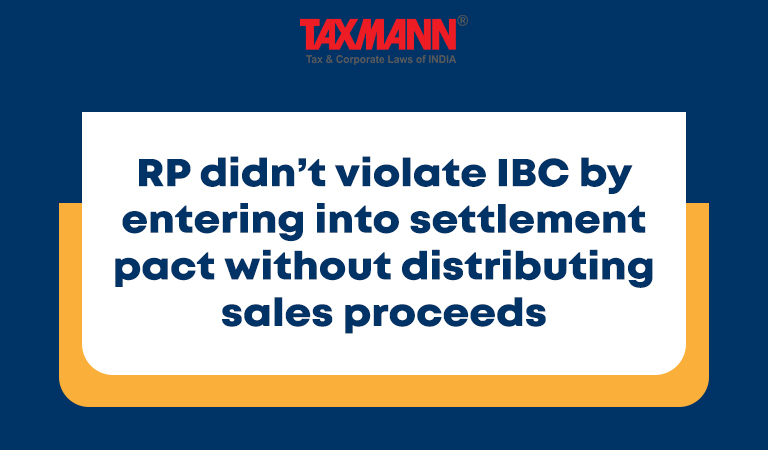RP didn’t violate IBC by entering into settlement pact without distributing sales proceeds
- Blog|News|Insolvency and Bankruptcy Code|
- 3 Min Read
- By Taxmann
- |
- Last Updated on 2 September, 2022

Case Details: Anil Kohli, In re - [2022] 141 taxmann.com 382 (IBBI)
Judiciary and Counsel Details
-
- Dr Mukulita Vijayawargiya, Whole Time Member, IBBI
Facts of the Case
In the instant case, Mr. Anil Kohli (‘A’) was appointed as an interim resolution professional (IRP)/resolution professional (RP) in the CIRP of corporate debtors. IBBI appointed an inspecting authority (IA) to conduct the inspection against IRP/RP dated 03.10.2019.
Thereafter, IA submitted the Final Inspection Report (FIR) on 31.03.2021, in accordance with regulation 6(4) of the Inspection Regulations, 2017. A show cause notice was issued to IRP/RP based on the material available on record including the inspection report in respect of his role as an IRP/RP in the CIRP of corporate debtors.
The show cause notice alleged contraventions of sections 53 and section 208(2)(a) and (e) of the IBC. Section 53 of the IBC provides that the proceeds from the sale of the liquidation assets shall be distributed in the order of priority and within such period and in such manner as specified. Accordingly, it was alleged that Mr. A prima facie violated section 53 of the Code by entering into a settlement agreement with Workmen & Employees.
The contention of Mr. A was that settlement entered into between Mr. Kohli and the workers’ union could not be enforced and was withdrawn, thereby causing no prejudice to any stakeholder was untenable as section 53 explicitly provides for disbursement of proceeds of liquidation.
However, it was noted that the said settlement was made with workers on the advice of stakeholders, in good faith to settle the issues of workmen for the purpose of completion of the liquidation process and moreover, the same was not executed and enforced.
Further, section 208 of the IBC provides for the functions and obligations of insolvency professionals. It states that every insolvency professional shall abide by the following code of conduct – (a) to take reasonable care and diligence while performing his duties; (b) to perform his functions in such manner and subject to such conditions as may be specified.
Therefore, the IP is expected to function with reasonable care and diligence to ensure the credibility of the process and at all times abide by the Code, rules, regulations, and guidelines thereunder.
IBBI Held
The IBBI held that since the settlement agreement between RP and workmen was entered into on the advice of secured creditors in good faith for early completion of the liquidation process, and RP didn’t distribute any amount of sale proceeds contrary to section 53, no act had been done by RP in contravention of the IBC.
The IBBI, further held that where SCN was issued by the IBBI alleging that IRP/RP circulated minutes of the meeting of CoC with delay, which should have been done within 48 hours, since such delay in the circulation of minutes of the meeting was only due to fact that time of 48 hours was falling on a holiday, no contravention could be found against RP.
List of Cases Referred to
-
- Alchemist Asset Reconstruction Co. Ltd. v. Moser Baer India Ltd. [2018] 90 taxmann.com 105 (NCLT – New Delhi) (para 1.1)
- Agarwal Marketing & Services (Energy) (P.) Ltd. v. Max Tech Oil & Gas (P.) Ltd. [2018] 90 taxmann.com 101 (NCLT – New Delhi) (para 1.1)
- Bank of India v. Vegan Colloids Ltd. [2017] 88 taxmann.com 145 (NCLT – Chd.) (para 1.1).
Disclaimer: The content/information published on the website is only for general information of the user and shall not be construed as legal advice. While the Taxmann has exercised reasonable efforts to ensure the veracity of information/content published, Taxmann shall be under no liability in any manner whatsoever for incorrect information, if any.

Taxmann Publications has a dedicated in-house Research & Editorial Team. This team consists of a team of Chartered Accountants, Company Secretaries, and Lawyers. This team works under the guidance and supervision of editor-in-chief Mr Rakesh Bhargava.
The Research and Editorial Team is responsible for developing reliable and accurate content for the readers. The team follows the six-sigma approach to achieve the benchmark of zero error in its publications and research platforms. The team ensures that the following publication guidelines are thoroughly followed while developing the content:
- The statutory material is obtained only from the authorized and reliable sources
- All the latest developments in the judicial and legislative fields are covered
- Prepare the analytical write-ups on current, controversial, and important issues to help the readers to understand the concept and its implications
- Every content published by Taxmann is complete, accurate and lucid
- All evidence-based statements are supported with proper reference to Section, Circular No., Notification No. or citations
- The golden rules of grammar, style and consistency are thoroughly followed
- Font and size that’s easy to read and remain consistent across all imprint and digital publications are applied



 CA | CS | CMA
CA | CS | CMA
